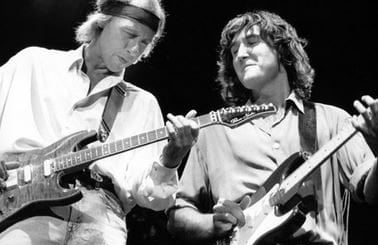The Man’s Too Strong by Dire Straits Lyrics Meaning – Dissecting the Timeless Testimony of Power and Conscience
Lyrics
And I’ve called the tune to many a torching session
Now they say I am a war criminal and I’m fading away
Father, please, hear my confession
I have legalized robbery, called it belief
I have run with the money, I have hid like a thief
Rewritten history with my armies of my crooks
Invented memories; I did burn all the books
And I can still hear his laughter and I can still hear his song
The man’s too big, the man’s too strong
Well, I have tried to be meek and I have tried to be mild
But I spat like a woman and I sulked like a child
I have lived behind walls that have made me alone
Striven for peace, which I never have known
And I can still hear his laughter and I can still hear his song
The man’s too big, the man’s too strong
Well, the sun rose on the courtyard and they all did hear him say
You always was a Judas, but I got you anyway
You may have got your silver, but I swear upon my life
Your sister gave me diamonds and I gave them to your wife
Oh, father, please, help me for I have done wrong
The man’s too big, the man’s too strong
In a haunting exploration of power, guilt, and the indelibility of actions, Dire Straits’ ‘The Man’s Too Strong’ stands as a testament to the narrative power of music. More than just a lyrical journey, this track from their fifth album ‘Brothers in Arms’ has etched itself into the soul of listeners as a poignant reflection on the human condition.
With its rich folk storytelling wrapped in a rock ballad, the song navigates the treacherous waters of morality, penance, and the unstoppable tide of consequences from the perspective of a war-torn narrator. The gravity of the song’s message coupled with Mark Knopfler’s distinctive voice makes for a compelling listen that invites in-depth analysis and interpretation.
The March of the Fallen Drummer Boy: Setting the War-Torn Stage
The song opens with the haunting declaration of an ‘aging drummer boy,’ whose hands have drummed the rhythms to the dance of destruction. His admission to ‘many a torching session’ instantly paints a canvas of war, loss, and the orchestration of acts that dance on the knife’s edge between heroism and villainy.
Bearing the scars of vanished youth and innocence, the character emerges as a Frankenstein monster of societal design, revealing the unseen wounds inflicted by the expectations and duties of warfare. This stark beginning challenges the listener to delve beyond the judgments of right and wrong, fixating instead on the machinery of human conflict.
Confessions from an Empire’s Shadow: The Remorse of Rewritten History
In his confession, the protagonist reflects on their own complicity in ‘legalized robbery’ and deceit, unearthing the grim reality of historical fabrication. ‘Rewritten history with my armies of my crooks’ speaks not only to personal regret but also to a collective amnesia — where society often glorifies its actions amid the silence of the conquered.
The lyrics suggest a man who played a pivotal role in constructing an empire’s narrative, only to find himself haunted by the moral cost of his actions. His struggle with the weight of usurped history and tarnished morals echoes the internal battles faced by powerful figures through the ages.
Unyielding Echoes of Power: The Inescapable Chorus
The chorus conveys the unnerving omnipresence of the powerful man — ‘the man’s too big, the man’s too strong.’ Despite efforts to repent or redirect, the legacy of might and the force of deeds already done seem too great to dismantle.
This repeated realization serves as both confession and condemnation, emphasizing that the very power attained is what now imprisons the soul. It underscores the insurmountable perception of self-versus-system that is a central tenet of the struggle for redemption.
The Haunting Allegory of Judas: Betrayal and Redemption
The song’s penultimate verse weaves in the biblical allegory of Judas, adding a layer of betrayal and the complexity of motivations. The narrator, recognizing their own betrayal akin to that of the gospel’s most notorious figure, puts forth a raw portrayal of human weakness and the bargaining of values.
In depicting a dialogue with betrayal, the song conjures images of a world where loyalty is a currency as fickle as the wealth and gemstones exchanged beneath the table. This narrative twist forces the listener to confront the uncomfortable proximity of loyalty and treachery, further complicating the path towards atonement.
The Man’s Too Strong: Pondering the Hidden Significance
Beyond the surface narrative, ‘The Man’s Too Strong’ harbors a plethora of interpretations about the human psyche and societal constructs. Could ‘the man’ be an internal struggle, personifying the overpowering vices or guilt that dominates a man’s actions?
Alternatively, the titular man could be emblematic of an Orwellian society — an invincible, faceless leader whose doctrine cannot be contested. This deeper dive into the song’s lyrics beckons listeners to reflect on the immutable nature of their choices and the lengths to which individuals and collectives go to justify acts of dominion and subjugation.








